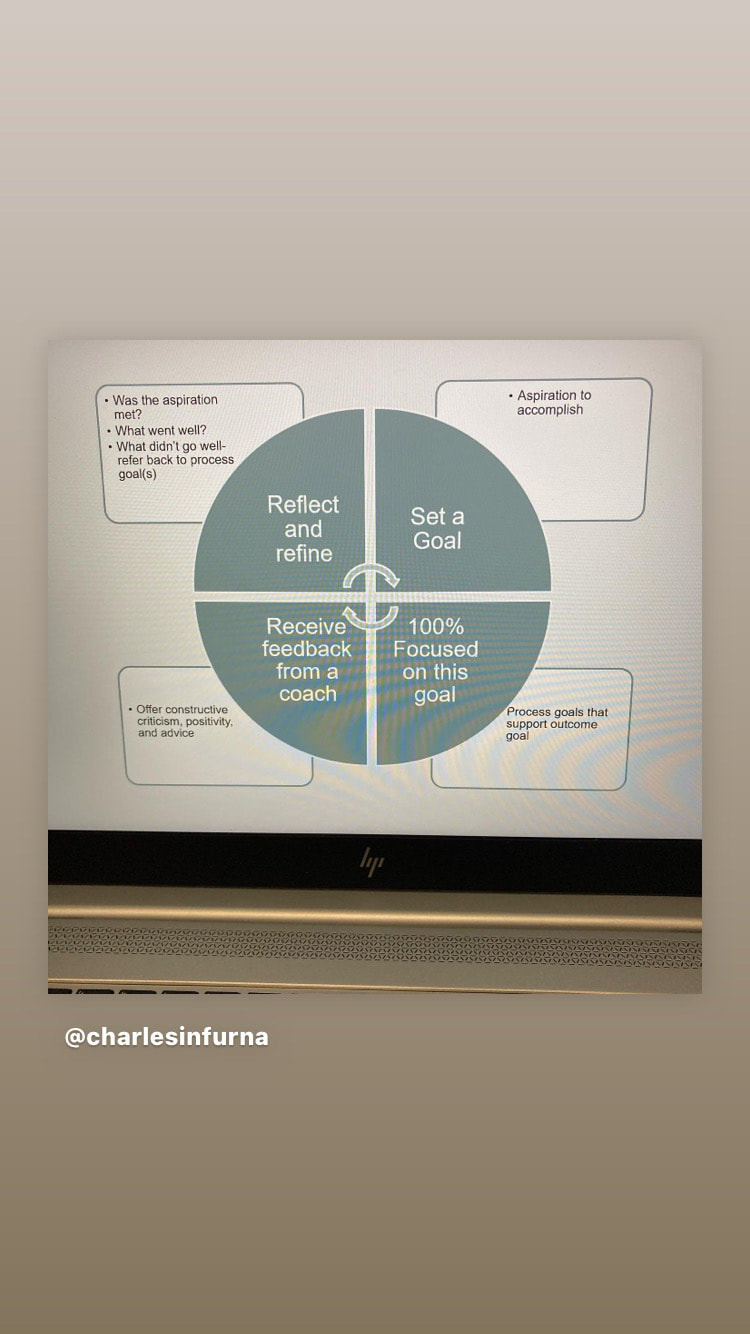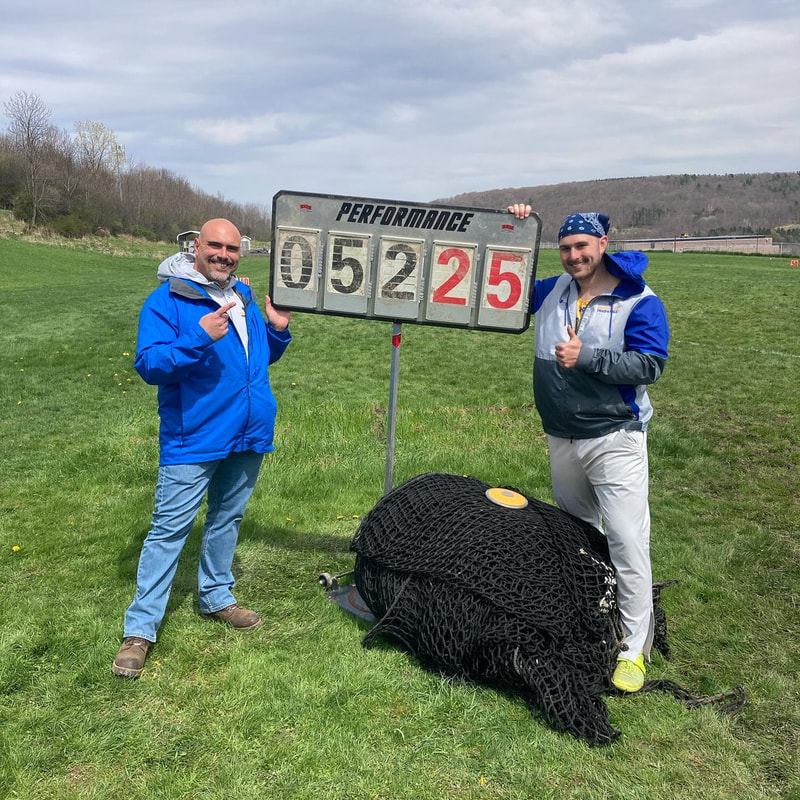|
Yesterday I had a great conversation with a former athlete of mine that is now a very successful throwing coach in Division II. We were discussing athlete performances at nationals this year, and we came to a point where we agreed to disagree on how/why some athletes are able to perform at big competitions (nationals) and other athletes do not perform as well. Our impasse came when discussing prior athlete experiences.
From my experiences, athletes that compete well in high anxiety high stress competitions do so thanks in part to competing in those types of prior competitions (past experiences). There is research to support the rationale that having been placed in a high anxiety setting prior allows athletes to tap into those past experiences when in the current moment of competition, thus allowing for the opportunity to perform better in that instance (Chambliss, 1989; McCosker et al., 2019; Infurna, 2022). What has been neglected in the current research is how those early experiences translate to competitive experiences specific to high-school age athletes that transition to competing at the collegiate levels. Chambliss’ (1989) experiences with Olympic swimmers in the early 1980’s focused on not only adult-aged athletes, but junior athletes enrolled in high-school that were performing at the Olympic level (most of which were competing in the Olympics before transitioning to collegiate swimming). McCosker and colleagues (2019) qualitative study focused on track and field coaches that were currently working with Olympic/World Championship participating long-jumpers. Infurna (2022), similar to McCosker et al., (2019), emphasized the experiences of throwing coaches and their perceptions of coach-athlete relationships when working with throwers that had competed at the Olympic Games/World Championships. Essentially, here we are. I provided a very brief overview of a few studies that focused on Olympic athletes and the role coaches play in mitigating performances at the highest level of competition (Olympic Games/World Championships). Unfortunately, 99% of us as coaches will probably never coach an Olympic Games/World Championship participating athlete, but we do coach and mentor high level high-school and collegiate throwers. A couple of questions for the group: First, to what extent does the role of the coach play at the collegiate level in affecting/influencing throwing performances? Does the extent differ by division? Second, to what extent do prior high level high-school competitive experiences play in affecting throwing performances at the collegiate level? Does the extent differ by division? References Chambliss, D. F. (1989). The mundanity of excellence: An ethnographic report on stratification and Olympic swimmers. Sociological theory, 7(1), 70-86. Infurna, C. J. (2022). Sustained success at the Olympic level: Perspectives on coach-athlete relationships from track and field throwing coaches. Track Coach (winter). McCosker, C., Renshaw, I., Russell, S., Polman, R., & Davids, K. (2019). The role of elite coaches’ expertise in identifying key constraints on long jump performance: how practice task designs can enhance athlete self-regulation in competition. I don’t believe this is a topic I’ve discussed much, if at all in the past. I think it’s an interesting topic that isn’t really discussed much on social media, but there is ample research in the coach-athlete relationship space about relationships and when/how they come to an end. I experienced my first post-collegiate break up with an athlete over this past weekend. After reflecting upon it for the past couple of days, I have wrapped my mind around what (from my perspective) went wrong and how the relationship may have been extended due to extenuating outcomes (from the possible perspective of the athlete).
Before I really get started here, I think it’s important to share that I believe that a large majority of throwers at the high-school and collegiate levels throw because they have some type of goal they want to achieve and distance they want to ultimately throw. For the very few throwers at that level, I believe they compete and join track teams because they want to be part of a group of individuals that share similar passions, i.e. throwing. And for that very small group of throwers, their ultimate goal isn’t simply to throw far(ther), but rather be around a group of individuals and have fun. Not sure what the percentage might be, but it would probably be fair to say the split might look like 90/10 or 95/5. Alright, getting back to our situation at hand. After a few text message exchanges and a Zoom chat we were well on our way to getting started and hopefully throwing farther. The athlete sent me a few of their throws via text message and I would send back some thoughts about their technique and share some tips via the Coaching Eye app. Their five or six second video clips would turn into a couple minute videos about technique; foot placement, hips, shoulders, eyes, etc. A couple of suggestions and drills to support the new technique. We did this for approximately a couple of months. In that time, this athlete had two competitions. Unfortunately, as their practice technique got more efficient and they were implementing mindset strategies to help support the new technique, things wouldn’t go as smoothly in competition. In my opinion, their technique improved in the two competitions we worked together, however their distances did not improve. Quite the opposite actually. Their distances from competition 1 to competition 2 in which we worked together got worse. As I’m writing this now, I’m still trying to figure out what would cause the change from practice to competition. I have a pretty good idea, but that can be saved for another post. This past weekend we discussed how the competition went. Before long, the athlete told me they were going to search for a more local coach and thanked me for my help. I wished them the best in hopes of finding the distances they were searching for with me as their coach. So, what went wrong… From my perspective, this is a list of what I think went wrong in this situation. Hopefully this list can help other coaches who might be in similar predicaments with coaching athletes at any level through a club or other affiliation not associated with a school/college/university. 1. Lack of Clear Expectations If you have got this far, you might be able to see (or read) that the expectations of the athlete were simply to throw farther. Of course I understand that. There are a multitude of factors that play a role in how well someone is going to compete (or throw) on a given day. Some factors within their ultimate control and others not (travel, weather, time of day, etc.). I failed to share and set clear expectations for what this coach-athlete relationship would look like. In this case, the expectation of throwing farther immediately after beginning to work together (i.e. a couple of months). I should have known better. Changing technique and providing technical and mindset cues takes time and effort. Providing the cues is one thing, implementing them is something altogether. 2. Goal-Setting: It isn’t always about throwing farther, or is it? The only mention of achieving a goal was for this athlete to qualify for a specific meet in which they need to reach a certain ranking in order to be eligible and to throw farther. I failed to share specific process goal related outcomes/scenarios that would have removed any anxiety, fear, or apprehension the athlete had about reaching a certain ranking and hitting a certain distance in an event. Completing a certain number of physical repetitions per week, practicing mental rehearsal cues, etc. are all outcomes that can be strived for. A sole focus on throwing farther without implementing strategies discussed (see 1) sets the coach and athlete up for disaster. 3. How to Receive Information I did not discuss with the athlete how they like to receive feedback regarding their technique and how to share information about cues and drills to incorporate. The athlete would text me their throws, I would upload them to Coaches Eye, include ideas, and send back to the athlete with links of visual cues to review from other athletes, as well as mindset activities to incorporate to better prepare for the heightened anxiety of attempting to perform well when a top ranking is on the line. Again, if you made it this far-thank you! Essentially, from the perspective of the athlete, I believe that because they didn’t improve their distances in competition they decided I wasn’t the right coach for them and they wanted to make a change. No hard feelings at all. As I mentioned, I wished the athlete nothing but the very best of luck in their future endeavors. I do believe that the right combination of communication, expectations, and outlining goals/aspirations makes for a healthy coach-athlete relationship. You can add accountability as well. In situations where the athlete is solely relying on their own effort in competition (diving, swimming-not relay races, throwing, golf, singles tennis, wrestling, badminton, racquetball, etc.) it requires athletes and coaches alike to take a deeper look at what is happening, not only when the athlete is successful (how they define success) but not as successful as well and be critical of what needs to better be communicated to ensure the athlete is given the best possible opportunity to reach their goals. The postseason in any sport can be summed up by being exciting, causing a state of anxiety, and all points in-between. Much like any 80’s professional wrestling interview, it can go in a multitude of directions. From a coaching perspective, we want to get from point A to our final destination in the most straightforward way possible. As is in life, things don’t always go as we plan. After a spectacular competition at our regional championships, we were 8 days out from competing at the DIII Outdoor Track and Field National Championships. Dylan won the regional meet by throwing 52.82m. A new personal best, school record, and meet record all rolled into one throw. We were literally on the fast track to nationals. I’ll take an aside here and mention that going to nationals is an athlete’s reward for all the work, time, and dedication spent on becoming the best athlete they can become over the course of an indoor or outdoor season. The stratification is simple, the top 20 individual athletes qualify for the meet. It is once the athletes are there that the season essentially starts over again and that the initial seed marks and qualifying times don’t matter as much as they should. The 2022 outdoor meet was no exception to the fact that having the best seed time, distance, mark would result in winning the actual competition. The new competition where the 20th seeded individual has just as good a chance to earn the title of All-American as the top seeded individual. If you coach long enough, you probably have first hand experience and have been witness to the upsets, the meltdowns, and all points in-between. As advertised, the men’s discus competition was held on Thursday, May 26th at the beautiful SPIRE Institute in Geneva, OH. The facilities were amazing and the officials kept the competition moving at a reasonable pace considering the high stakes nature of the competition.
After all 20 men’s discus throwers were introduced, flight 1 began their warm-ups. I enjoy watching warm-ups especially at the national meets because it tells a lot about a thrower’s and coaches philosophy on getting ready to compete. Some throwers were dropping big time throws, while others were more matter of fact with what was happening around them. I’m not sure if there is a better way to warm up, but whatever works best for the athletes is how one should handle that portion of the competition. Also as expected, two throwers from flight 1 threw distances that were likely going to put them into the finals of the competition. In every national championship meet I’ve attended with an athlete, there are always a couple of throwers that throw well enough to secure a shot at earning an All-American award. There were 10 throwers in flight 1. There were 10 throwers in flight 2. That means that a couple of throwers from flight 2 would not be moving forward into the finals. Dylan warmed up really well. He took his usual five warm up throws spaced out a little more than usual because of the time offered to the athletes, 20 minutes. It was the smallest qualifying flight he had competed in all season with the most amount of time available to warm up. I knew that as long as Dylan hit a throw over 50m that he would all but secure a place in the finals with the chance to earn A-A. All of our work during this 2021-22 season had led us to this point. The foundation for this competition was put down during the 2020-21 season. Dylan’s first throw was a left sector foul. Nothing out of the ordinary for a foul for him, but the first first round foul in a couple of months. His second round throw was a right sector foul. Same thing, he’d done that before during the season. However, it was the first time he started off a meet with two fouls since his first meet of the season the first week of April. I didn’t share anything new with him in-between throws. I told him he looked good in the circle, to make some (minor) technical adjustments, and to trust everything he had done up until this point in the season. Earlier in the morning during breakfast I shared some thoughts with Dylan about competing, taking in the sights and sounds, and enjoying the moment of earning a shot of competing at the national championships. I’d venture to guess that > 95% of DIII athletes never have the opportunity to compete at a meet like this and that what he was about to do was very special and that he should be proud of getting here. But there was also work to still be done. As Dylan was stepping into the circle for round 3 I knew that he had to throw at least 49m to get into the finals. To be more precise, 49.05m. Dylan was thrower 8 of 10, and the 9th and 10th throwers in the flight were already guaranteed a spot in the finals. Without saying as such, I know Dylan knew the distance as well. From where we were standing behind the circle it was difficult to gauge the distance of his throw. It looked really close to the 50m line. Over 50m would guarantee a spot in the finals. The big board flashed 48.82m, 11th place. I felt this crushing blow in the pit of my stomach that I’ve only felt a few times in my life. I shook Dylan’s hand and said congratulations on an amazing season. He walked past me to sit down. As he sat down I felt a couple of tears roll down my face. I was devastated. Dylan was devastated. I watched the final two throwers in the flight take their final attempts. As that was happening a sudden rush of emotions came over my body. A million and one thoughts were going through my mind, most of which focused on what I could have done differently/better to have avoided putting my athlete in this situation. What could I have done differently to have ensured this was not going to happen. What else could have been done. What if… None of us said much after the second flight finished up. The coaches in attendance (Tim, Steph, Trevor, myself) and our awesome AT (Becca) just kind of looked at each other in disbelief. I pulled out my notebook and realized this was Dylan’s second lowest distance thrown of the season. He opened his season with a throw of 48.52m the first week of April. Here we were 10 weeks later with a throw of 48.82m. Any other one of his top 15 throws of the season would have put him in the finals and earned at least 8th place. 49.73m earned 8th place. Just about 3m below Dylan’s personal best. It didn’t happen on this day. Dylan completed his senior season as arguably the most decorated thrower in Alfred State history. Dylan broke the 26 year old Alfred State discus record, broke his hammer record, broke the CSAC discus and hammer meet records, and set the regional meet record in the discus with his 52.82m throw. Since Alfred State’s transition to Division III, he is the first thrower to qualify for nationals. He won the shot-put, discus, and hammer throw competitions at the CSAC championships. Most importantly, Dylan graduated with a 3.96 GPA in Engineering. His first day on the job was yesterday, May 31, 2022. I cannot be more proud of Dylan and everything he accomplished as a thrower at Alfred State. I’m sure when Dylan is ready he will share his story, the story that began after he first stepped foot on campus. I think I’ve shared a good portion of his story and career beginning in the fall of 2020. He has a much more interesting story that led up to competing at nationals a few days ago. If you have been following along with what I have been sharing the past couple of weeks on Instagram, TikTok, and YouTube, you’ll see what I’ve spent quite a deal of time discussing deliberate practice. I first discussed the topic a few years ago. I’ve written about it in the past and shared some insight, but I didn’t really speak about the research behind the topic.
In his book Peak, Dr. Anders Ericsson introduced us to the term deliberate practice and the research behind the topic. Over the course of his research career, Dr. Ericsson focused his time on studying experts in the fields of music, medicine, athletics, education, and business. What he discovered was that contrary to the 10,000 hour rule made famous by Malcolm Gladwell, was that the quality of the time spent practicing a specific skill was more important than the total amount of hours spent practicing that specific skill. Essentially Dr. Ericsson’s research suggests that quality, and not necessarily quantity, is what will give individuals the best opportunity to become experts in their chosen fields. I find Dr. Ericsson’s research is rather interesting. It may go against some societal norms that suggest how much time we spend on something is going to produce higher quality results compared to the time spent on trying to accomplish something. Dan Chambliss found similarities in his research that examined national caliber swimmers training for the 1984 Olympic Games. Dr. Chambliss found that when a group of like minded individuals (swimmers) are completing the same tasks (mundane) in a highly competitive environment (Mission Viejo) over a long period of time (Olympic Quad) with consistent feedback and refinement from their coach, they give themselves a better opportunity to achieve their goal (qualify for an Olympic team) compared to their peers that may be missing an ingredient from the recipe shared. Fast forward 20 years and similar ingredients were brought together to help a different recipe take shape, qualifying for the Olympic Games in track and field. A group of elite level throwers were brought together in 2001/2002 with the aspirations of representing Canada and the United States in the shot-put, hammer, and discus events in international competition. This group was called Ashland Elite. Their coach was 4x Olympian Jud Logan. This group of like minded individuals (throwers) were following similar training plans (mundane) in a highly competitive environment (Ashland Elite; Ashland, OH) over a long period of time (Olympic quads) with consistent feedback and refinement from Jud. This training group produced Olympic Games qualifiers in Kibwe Johnson (2012, 2016) and A.G. Kruger (2004, 2008, 2012) in the hammer throw. Derek and Joe Woodske represented Canada in international competition in the hammer throw. Crystal (Smith) Johnson also represented Canada in international competition in the hammer throw. Adriane (Blewitt) Wilson competed at the 2004, 2008, and 2012 Olympic Trials in the shot-put and has gone on to win 5 world championships in the Highland Games. The right combination of ingredients were mixed together that ended up producing quite a potent recipe for athlete success. When replicated under different training conditions (track and field-throwing and swimming) similar athlete outcomes are achieved. It is certainly a conversation for a different day, but under the right circumstances with a determined end result high level athletes tend to achieve their goals. In these two examples, the end results were representing their respective countries in international competition. On the surface it seems like an easy recipe to put together. A difficult ingredient to measure out is sacrifice, the willingness to put other aspirations (life) on hold long enough for one to achieve their unique and specific goal. Anders, Dan, and Jud all shared similar outlooks when it came to what it took to reach a certain level of elite status as an athlete. They understood that under the right conditions and quality amounts of time that elite athletes would be better able to achieve their goals. Now it isn’t to say that elite level athletes training alone won’t achieve their goals, but training with a group under the watchful eye of a coach gives the athletes a better chance. It makes sense considering that there are Olympic training centers around the United States (Chula Vista, CA, Colorado Springs, CO, Geneva, OH, and Lake Placid, NY) in place to give elite athletes the opportunity to qualify for the Olympic Games. When referring back to our figure on deliberate practice, the Olympic training centers are all following the same pattern, bringing together elite athletes so that they can 100% focus on their goals under the watchful eyes of coaches that give the athletes the best possible opportunities to qualify for an Olympic Games. From the conclusion of our CSAC championships in 2021 to the start of the same championship in 2022 there were exactly 365 days. Depending on your perspective, that is either a long time or not enough time. As a coach, I error on the latter. For an athlete, I would guess the former. When attempting to discuss goals and long-term aspirations with athletes, I try to take a year by year approach to the conversation. We look at what went well, what didn’t go well, and what we think we can do differently for the upcoming season. In most cases, the typical concepts about training harder over the summer, coming back to campus in shape, and being more diligent (not sure how you track this without tracking what diligent is) during the course of the season. Intentions always begin well and good. The athletes go home for the summer, they have a training program, and things go pretty well for a couple of weeks (maybe even 3 sometimes). Then the reality of training hits, disengagement occurs, and the athletes maybe don’t train as hard as they should. They might miss a session or two, which then snowballs into a week or two. Before they know it, they are back on campus at the end of August with two months of potential lost training time. And then the season begins… I share this for a couple of reasons. First, last year at our CSAC conference championships, Dylan had a pretty good overall performance. He scored in the shot-put, discus, and hammer competitions. Overall, he was well within 90% of his then personal best distances. He ended the season with a personal best of 46.16m in the discus and 49m in the hammer. The former set the school record. The week after the competition, at Regionals, we had a conversation about expectations for the upcoming 2021-22 season. We discussed goals, expectations (of course), and aspirations to reach and accomplish his upcoming senior season. Together, we developed a plan that would help him get 365 days later, to our 2022 CSAC conference championships. So far this season, Dylan has thrown the discus 52.25m (+6m), the hammer 52.84m (+3m), and the shot-put 14.27m (+2m) compared to last season. It is often said that it takes 10 years to become an overnight success. In Dylan’s case, let’s say his collegiate experience (4 years). I’ve known Dylan for two years. He completes all of his weight room sessions, is attentive in practice, and is determined to accomplish his throwing goals. All while balancing a course load as a future engineer and a GPA over 3.8. And then mix in the social aspects of college.
For the younger or new throwers out there that see what I share via social media, if you close enough you’ll see some of the lowlights as well. I try to keep things honest with throwing and my perspective as a coach. We’ve grown from the lows of last year. The highlights are a manifestation of the work and diligence Dylan has put in over the course of the last 365 days. Hitting personal best throws in competition when it matters is great, but also take into consideration the misses and foul outs from prior years. What I’d like to share is this. It takes hard work, persistence, an open mind, and a willingness to learn in order to develop into an elite level thrower. It does take time. There will be days when you will think to yourself why am I still doing this, or I’m not getting better, or it’s too hard. I can assure you that all of us at one time had thoughts like that. The perceived losses of today help build and illuminate a brighter path for the successes of tomorrow. It’s having a plan, sticking to the plan, and giving your best effort on that plan. It isn’t trying one path for a couple of weeks, then taking a detour for a week, then missing a week, then trying to come back where you left off. It is engaging in conversation with your coach(es) over the summer and figuring out what might not be working and tweaking the path a bit. It is about staying accountable to your process goals. It is about managing expectations. Your expectations. It is as simple as staying true to the course and winning the daily moments. It isn’t easy, but it is that simple. CSAC Championships This past weekend Alfred State hosted the 2022 Outdoor CSAC championships. The hammer and discus competitions were held on Saturday, May 7th. The shot-put and javelin competitions were held on Sunday, May 8th (Mother’s Day). As our group of throwers competed over the two days, we couldn’t have scripted a better outcome for their performances. Women’s Discus Nicole, Emma, Kelly, and Kenzie got things going with the first event of the day, the women’s discus. The conditions were good for throwing; about 55 degrees, some sun, and very little wind. Our throwers came ready to compete! Nicole won with a throw of 33.56m, just 1cm off of her personal best. Emma finished 3rd and Kenzie finished 7th. It is the second consecutive year a female thrower from Alfred State won the discus competition. Last year Emma won with a throw just over 30m. (16pts.) Men’s Discus The atmosphere created by our female discus throwers continued into the men’s discus competition. From my recollection, besides attending an outdoor national championship meet, Dylan and Dan had a great duel with monster throws. Dylan won the competition with his 2nd round throw of 52.25m. That is a conference and meet record throw. At the time of this writing (Monday, May 9th, 2022) it currently places him in 3rd overall at the DIII level. Dan finished second with a throw of 49.20m, which currently places him 20th at the DIII level. Dylan had 5 fair throws all over 49.63m. So far, this is his best series of the season. James finished 3rd with a throw of 36.21m, and Wilfredo had a personal best throw of 27.58m. (16pts.) Women’s Hammer Continuing with where our female throwers left off in the discus, Nicole hit a big throw of 39.05m to win. Kenzie finished 6th with a throw of 22.41m. (11pts.) Men’s Hammer Similar to how the women fared, Dylan won the competition with a throw of 52.53m. This throw is a conference championship meet record. James finished 3rd with a personal best throw of 39.01m. (16pts.) My overall thoughts about how Day 1 went are nothing short of pleased. Not just pleased with the distances our throwers hit in competition, but with the energy and excitement they competed with. This was fueled by their teammates that were there to watch and cheer everyone on. Yes, the distances are nice, but having support from your teammates and bringing a fire and enthusiasm to competition is exciting to watch as a coach. It wasn’t a pep talk or magical words of encouragement that brought the fire, but a culmination of 26 weeks of work. Having home field advantage is nice, but the competitors from the other teams competing also brought a fire and intensity that I hadn’t yet witnessed in an outdoor competition this season. Everyone was engaged in what was going on and focused on the task at hand. It was a good way to end Day 1, with the hopes of the same energy and excitement spilling over into Day 2. Women’s Shot-Put Emma and Nicole had a great shot-put competition. Emma finished 2nd with a personal best throw of 10.79m. Nicole also had a personal best throw of 10.30m to finish 3rd. Overall, Nicole scored 26 throwing points over the two day competition. Emma scored 14 throwing points over the two day competition. (14pts.) Men’s Shot-Put It was a day of personal best throws! The women got things going, and the men’s squad didn’t disappoint either. Dylan finished 1st with a personal best throw of 14.27m. Wilfredo also hit a personal best throw of 10.07m to finish 7th. Dylan scored 30 points for the men’s squad. He set two conference meet records, as well as overall conference records in the discus and hammer. (10pts.) This past weekend was a great way to begin the conference championship and postseason part of our competition schedule. All of our throwers showed up to compete, were engaged in what was happening around them, and cheered on their teammates throughout the two day competition. |
Dr. Charles InfurnaCharles Infurna, Ed.D., is the owner and lead coach of Forza Athletics Track Club. Dr. Infurna has coached National Record Holders, National Champions, All-Americans, and Conference Champions at the Post-Collegiate, Collegiate, and High School level. Archives
January 2023
Categories |












 RSS Feed
RSS Feed